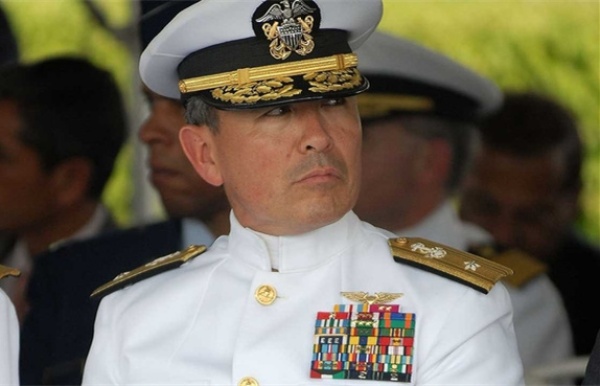
PACOM Commander Harris Making Things Even More Tense
Harris assumed command of the U.S. Pacific Fleet in 2013, and was promoted to commander of the U.S. Pacific Command (USPACOM) in May 2015, just in time for another new layer of tension in the South China Sea, and as America became a key outside interfering force leading to these changes. The entire U.S. military has increasingly emphasized its tough stance toward China, and Harris is one of the most prolific promoters. On different occasions, he has given speeches critical of China, showing the American military’s determination to preserve hegemony in the Western Pacific.
For instance, two days ago Harris somewhat unexpectedly warned China that were China to delimit any South China Sea air defense zone American forces would ignore it.
A logical result of this is that the Chinese public very much dislikes Harris, because in their view he is the “most unfriendly” USPACOM commander. Some Chinese have pointed out that he is half Japanese, and even used this to taunt him. Yet many Chinese scholars are opposed to such an association, and maintain that Harris’ attitude toward China and his Japanese ancestry are unrelated.
Given that the post of commander of the PACOM is a major one in the U.S. military, it is also an important diplomatic role. This position plays a decisive role in molding America’s safe relations toward China, and is an important link in the implementation of U.S.-China relations overall. While Harris is bound by the general trend in U.S.-China relations, in conflicts that occur in broader encounters between America and China, he also has the power to either lessen serious issues or, conversely, make large issues out of small ones.
Until now, there has been no sign that Harris is someone with interest in, or a sense of responsibility for, seriously protecting the South China Sea and its peaceful atmosphere. The fierce words he has for China are probably greater in number than his previous few predecessors, and even considering the last two years of tension in U.S.-China relations in the South China Sea, these displays still easily form people’s perception of his orientation: He is not friendly to China.
If the PACOM Commander makes any impression, it would be that his forces would charge in and establish the front line in the area, and also that he is just a pretty-faced star of U.S.-China relations — in which case, something bad is going to happen in the region.
China, of course, does not lack the ability to rebuke Harris, or even to cross verbal swords with him. We can just as easily go tit for tat in military exercises on the seas at our own doorstep. Harris has possibly fallen into a cycle of making mutual expressions of toughness with China.
Perhaps Harris does not merely wish to be loyal to American interests, but also understands exactly where the borders of Chinese interests exist, while simultaneously ascertaining China and America’s respective intentions in the South China Sea region. He ought to know that there are some Chinese who advocate scorn of American determination with Chinese determination, and his words are probably encouraging the will to fight on both sides.
Harris wishes to pull India into American and Japanese military demonstrations against China. This is likely just an empty show of strength. India is not America’s to mobilize, and there are also limits to the nerve of Japan, Australia and other American allies who enter the South China Sea and take substantive action there. If America really wishes to take some great action, perhaps it should have Harris take his own troops and go it alone.
Harris’ troops are undoubtedly the world’s most advanced, but it’s a pity that the South China Seas are so close to China. If both sides were to simulate exercises, the situation would be very complicated. If American forces make up their mind, Chinese goals in the South China Sea will become unsafe. If Chinese forces make up their mind, the American forces that make Chinese goals unsafe will themselves become unsafe. The two nuclear powers’ determination to push things to the very limits will have the world trembling in fear.
Overall, if during Harris’ term the South China Seas see any major event, the chances for him to score a win for America and receive the praises of the masses upon his homecoming are very small. At least this is what many Chinese believe.
Harris continuously reminds the Chinese that we need to fortify our construction on the South China Sea islands and reefs, and deploy more weapons systems. With the existence of the American military’s continued buildup in the South China Sea, in addition to deploying forces that are sufficient to meet the might of the challenging American forces, what other option do we have?
Now, of course, our advocacy for strengthening preparations against American military pressure directed at China is not to say that such considerations ought to guide our relations with [the U.S.]. U.S.-China relations are rich and extensive, like two hands reaching out toward each other, or even multiple hands reaching out; it is just this particular hand — that of Harris — that cannot become a life-threatening drawback.


China has unilaterally spoiled the “peaceful atmosphere” of the South China Sea. It has bullied its neighbors, changed facts on the ground by creating artificial islands, and is now militarizing the area. Tough luck for you that China’s bullying has brought the U.S. many allies in the region who are willing to stand up to China’s threats 🙂
Harris is loyal to his motherland, Japan.